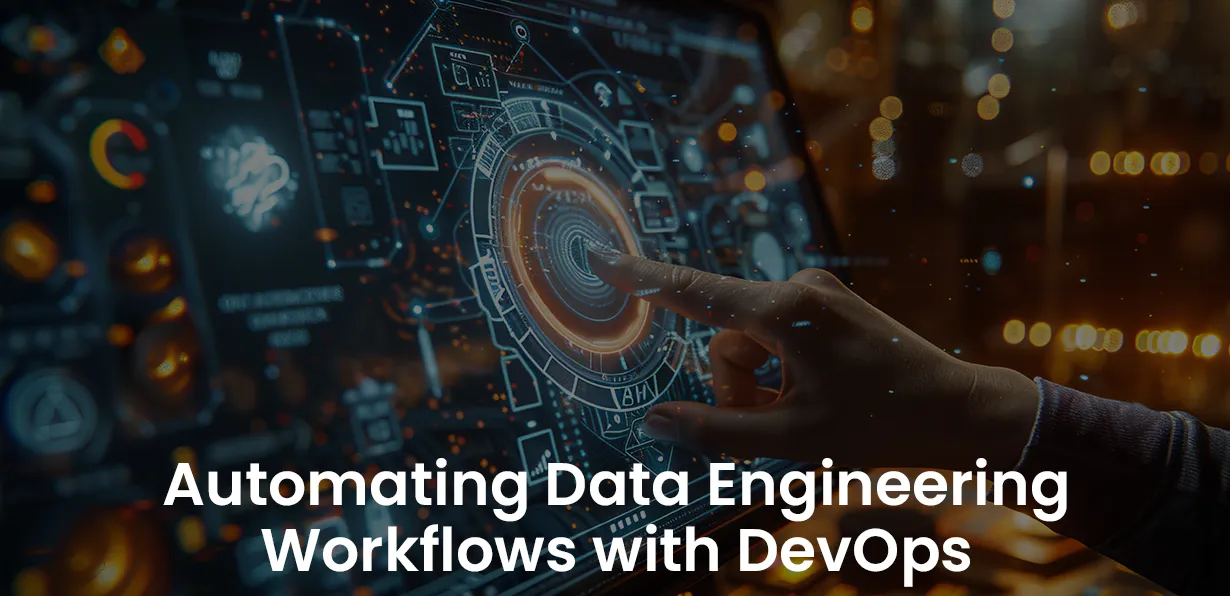Automating Data Engineering Workflows with DevOps
The DevOps methodology is famous for its radical transformation of software development, and IT operations are progressively advancing into data engineering. Along with the further development of modern business, a critical emphasis is placed on processing large amounts of information for decision-making and the creation of effective strategies. Because DevOps emphasizes integration, continuous improvement, and automation, it provides a rich context for enhancing data engineering.
Understanding DevOps
This hybrid of the words “development” and “operations” is an array of principles, methodologies, and policies that aim to break barriers between the individuals who create new software and the ones who maintain the applications. This approach has been a clear trend in recent years and strongly emphasizes teamwork and efficiency in delivering software and managing IT resources. By breaking the barriers between the numerous stereotypically unique departments, DevOps aims to increase the performance and effectiveness of software products and services.
Central to DevOps is the use of automation in this repetitive cycle across the SDLC. This entails the annual programming code compilation, testing, release, and configuration of system platforms. These tasks should not be done manually, as this leads to the introduction of errors. It is also time-consuming, especially when working on different releases, and the deployment environment is not the same as the development environment.
The other fundamental practice of DevOps is continuous integration and continuous delivery, commonly known as the CI/CD pipeline. Continuous integration and continuous delivery include frequent and automated testing, integration, and deployment of new code. This is because the methodology needs only a short amount of feedback, meaning that teams can put a halt to problems before establishing slower and more stable systems.
Besides, it is good to note that DevOps also strongly emphasizes monitoring and continuous feedback. This helps the team monitor the functioning of applications and their infrastructural support and address issues in real-time. This continuity of feedback creates a culture of continuous improvement in which the teams work constantly to improve the processes, not only the positive outcomes but also the mistakes made.
The Role of Data Engineering
Data engineering as a profession is growing, and its effectiveness can be seen in the explanations and elaborations of its various aspects.
Data engineering is deemed important in today’s scenario of the availability of a large amount of data as the foundational support for making effective use of data. This entails collecting, processing, and preserving the data so that it can be easily accessible and usable to data scientists, analysts, and everyone else. This discipline binds chaotic data feeds with something that an organization needs to make a decision.
While data engineers are also involved in data management, they are more concerned with data acquisition from different sources like databases, APIs, streaming platforms, etc. They usually come in different formats and structures, which engineers have to preprocess and transform into a proper dataset. It mainly covers data cleaning, data transformation, and data enrichment to make data ready for analysis.
Furthermore, data engineers also develop data pipelines, which are processes that handle moving data from its source to the place of utilization, such as the data warehouse or data lake. These pipelines are of great importance for the efficient and effective processing and storage of data. Most of the mentioned pipelines are built and managed using utilities such as Apache Spark, Apache Kafka, or any other cloud service.
DevOps and Data Engineering and How They Meet
The integration of DevOps and data engineering is a revolutionary innovation in the field, as it combines both DevOps and data prerequisites to improve the holding of data. DevOps, which originated in software development and IT operations, applies this concept of collaboration, automation, and continuous delivery to data engineering. It results in enabling more effective, flexible, and scalable ways of handling data.
Applying DevOps practices at the data engineering level means that organizations can automate the process of deploying the data pipelines and, thereby, ensure proper data flow from ingestion to consumption. It decreases human interference and, therefore, the risk of mistakes, which allows data engineers to increase the velocity of development according to changes in business requirements.
Key to this integration is the extent to which version control, CI/CD, and automated testing are implemented in data engineering. Different types of changes are tracked by version control systems such as Git, whereas the consistency, integration, and delivery of data pipelines are done by CI/CD. These practices make the data pipelines more dependable and, also, align the respective works of data engineers and data scientists with corresponding toolkits and methodologies.
Advantages of Implementing DevOps in Data Science
Incorporating DevOps principles into data engineering offers several advantages for organizations aiming to optimize their data processes:
1. Faster Time to Market:
DevOps principles such as automation CI/CD will minimize the timeframe that is needed to develop, test, and deploy data pipelines and applications that are vital in today’s fast-growing business market.
2. Improved Collaboration:
DevOps aims at bringing development, operation, and data teams into one frame of work. This approach overlaps data development and operations and has benefits that result in the strengthening of data pipelines.
3. Enhanced Quality and Reliability:
DevOps practices with testing, automation, and other aspects are beneficial in guaranteeing that the data pipelines and applications are reliable and of high quality in presenting data, thus eradicating any possible errors and inconsistencies.
4. Greater Scalability:
Secondly, DevOps practices help in the scaling of the data pipelines and infrastructure to accommodate the increasing volumes of data, be it through the scala up or up and out.
5. Reduced Downtime:
Continuous status measurement and automatic release of new changes enable the reduction of downtime and prompt rectification of problems occurring in the data pipelines where real-time or near-real-time data processing is being done.
Effective Strategies for Applying DevOps in Data Science
For effective DevOps implementation in data engineering, consider these best practices:
1. Foster Collaboration:
Promote active interaction between data engineers, data scientists, and other operational staff, especially when they are working on a big data project. Share cross-product teams and remain concise with the goal across the development process.
2. Automate and Use Infrastructure as Code (IaC):
Orchestrate the data pipeline; set up and scale up. IaC is very similar to managing code, and hence it can be versioned in a very manageable manner as configurations can be managed and released to target environments in a very controlled manner.
3. Utilize Version Control:
Use version control systems such as Git for the codes and configurations to be tracked in the change process, hence improving collaboration and minimizing errors.
4. Implement CI/CD:
It is to apply CI/CD pipelines in testing and deploying data pipelines in order. This practice aids in identifying and resolving problems at the earliest stages and confirms that the same is deployed to production subsequently.
Tools and technologies
In data engineering, DevOps practices use version control portfolios such as Git and continuous integration and continuous deployment techniques like Jenkins, Travis CI, and Circle CI, among others. All of them enhance the data pipeline and help in organizing the pipeline by encouraging proper data handling and workflow.
Conclusion:
Therefore, when organizations adopt DevOps practices for data engineering, it alters the ways in which they approach the process of managing and utilizing data. DevOps means the unification of the development and operations teams and the automation of processes that help to improve data engineering, creating effective collaboration and constant development. By following these principles, organizations are able to deal with their data successfully, remain successful, and keep up with the developments in the field of information technologies.


